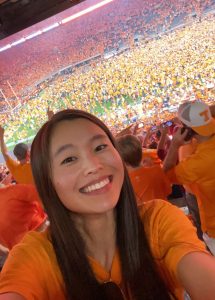How Cells Store Fat

Morgan House originally planned on attending medical school. But, her undergraduate research experience at UT in the lab of Professor Mariano Labrador made her realize she had a passion for research.
“I have always been interested in science, asking questions, and problem solving,” said House. “As I grew up, I watched many of my family members suffer from cancer and disease. I wanted to help somehow, and I thought that becoming a medical doctor was a way I could make a difference. During undergraduate school, I became aware of other job opportunities in science such as a research scientist. After spending time in my undergraduate research lab conducting experiments and generating data, I realized that going to graduate school would be the best fit for me and my future goals.”
Once she joined the BCMB graduate program, House chose very different areas of research for her rotations: microbiology, plant biology, and cell biology. She ended up joining the cell biology lab of Professor Amit Joshi where she is studying organelle biogenesis from the endoplasmic reticulum membrane.
“I joined this lab for a few reasons, one being microscopy,” she said. “I really enjoy being able to see what is happening in cells in real time. Another reason I was interested in the Joshi Lab is because of the implications of our research in human health. My research is centered around understanding how cells store fat in the form of lipid droplets using baker’s yeast as the model organism. With obesity and metabolic disorders being major health issues in the US, it is important to understand how excess fat is stored and utilized by the body. I hope that one day my research may have an impact on those suffering from these conditions.”
House recently presented her research at the Federation of American Societies for Experimental Biology (FASEB) Endoplasmic Reticulum conference in Melbourne, Florida. She was asked to give a talk based on her poster and won a best poster award.
“This experience gave me some new friends and contacts, and furthermore gave me confidence in myself as a researcher,” she said. “One of the best parts of BCMB is the community that we have. I always feel like I have someone to reach out to if I need help with my research or with personal problems. I think we are very collaborative and have a community that feels like a family.”
In her spare time, House enjoys collecting and caring for her houseplants and outdoor plants, playing the piano, and singing. She also loves Vol sports, so you can always catch her watching a game and sometimes attending them.